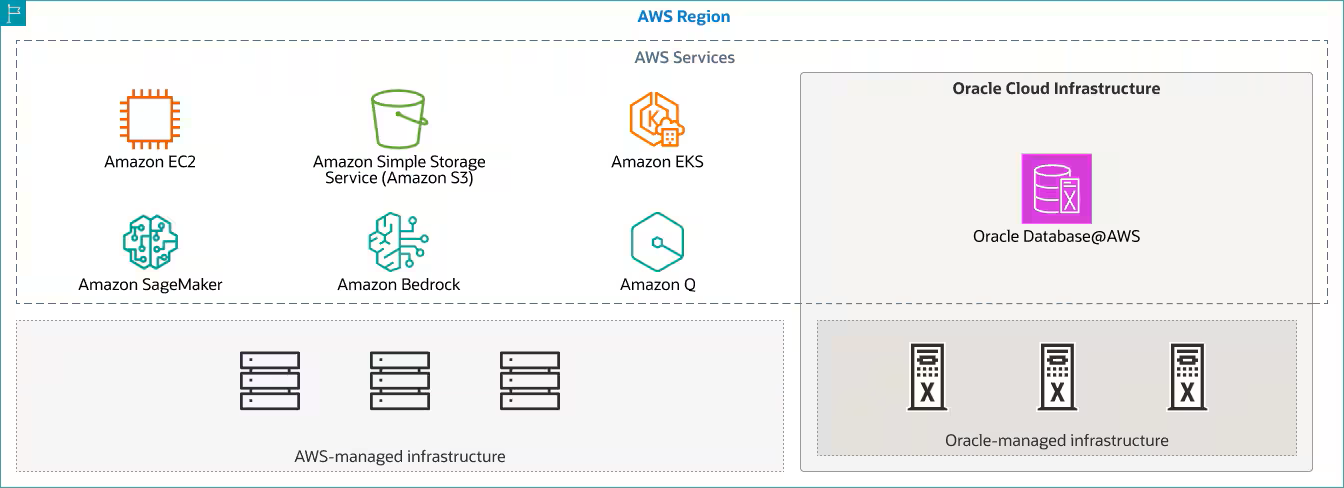What’s New with Oracle Multicloud is a monthly roundup of the latest multicloud information and resources. This edition includes the following highlights:
-
Oracle Database@AWS in limited availability
-
Oracle Database@Azure: Autonomous Database Serverless now supports APEX and JSON workload types
-
Selecting network topologies for Oracle Database@Google Cloud
-
Oracle application support for Oracle multicloud solutions
-
February 20 multicloud office hours: Use Autonomous Database in Azure and Google Cloud
Announcements
This month, we have the following announcements:
-
Oracle Database@AWS in limited availability since December 3, 2024: Customers can now run Oracle Exadata Database Service on Dedicated Infrastructure on Oracle Cloud Infrastructure (OCI) in Amazon Web Services (AWS), starting with the AWS N. Virginia (us-east4) region, to simplify the migration and deployment of enterprise workloads to the cloud. For more information, see Oracle Database@AWS Available in Limited Preview.

-
Oracle Database@Azure: Autonomous Database Serverless now supports APEX and JSON workload types: Oracle Autonomous JSON Database is ideal for applications that require flexible, NoSQL-style handling of JSON documents, allowing rapid adaptation to changing data needs. Oracle APEX Application Development is a low-cost application development service for rapidly building and deploying low-code applications. For more information, see Provisioning an Autonomous Database in the documentation.
-
Over 30 Oracle Database@Azure regions planned by end of 2025: Oracle Database@Azure is now available in South America and generally available in 10 Microsoft Azure regions. Customers can start using the Central US, Japan East, and Southeast Asia regions, with full availability coming soon. For more information, see the planned regions and services.
-
Oracle and Google Cloud expand regional availability and add powerful new capabilities to Oracle Database@Google Cloud: New cross-region disaster recovery capabilities for Oracle Autonomous Database Serverless and single-node Oracle Exadata Database Service Dedicated cluster option are available to Oracle Database@Google Cloud. For details, read the press release.
-
Oracle Database@Google Cloud in more regions and zones: We’re adding a second zone in Ashburn, London, and Frankfurt. Later this year, we expand to eight more regions globally, including Iowa, Montreal, Toronto, Delhi, Mumbai, Osaka, Tokyo, and Sao Paulo. For details, see Coming Soon: Oracle Database@Google Cloud in More Regions and Zones.
-
Announcing Terraform Providers for Oracle Database@Google Cloud: We’re excited to share the general availability of Terraform providers for Oracle Database@Google Cloud. You can now deploy and manage Oracle Autonomous Database and Oracle Exadata Database Service resources using the Google Terraform provider. For details, see Provision Oracle Database@Google Cloud resources with Terraform in the Google Cloud documentation.
-
Oracle application support for Oracle multicloud solutions: Oracle is pleased to announce support policies for Oracle E-Business Suite, PeopleSoft, JD Edwards EnterpriseOne, Enterprise Performance Management, and Oracle Retail Applications leveraging our latest multicloud solutions. For more information, see Announcing Oracle Application Support for Oracle Multicloud Solutions.
Resources
We also have the following resources to help you on your journey:
Oracle Database@AWS
-
Getting Started with Exadata Database Service on Oracle Database@AWS: An overview of the Oracle Database@AWS, including the benefits of the multicloud offering, how to create an ODB network, Exadata Infrastructure, Exadata VM Cluster, and an Oracle Database.
-
Provision Oracle Exadata Database Service in Oracle Database@AWS: This tutorial provides a step-by-step guide to provisioning and configuring Oracle Exadata Database on AWS.
-
Monitor Exadata VM Cluster via Amazon CloudWatch in Oracle Database@AWS: Use the Amazon CloudWatch dashboard on the AWS console to monitor the performance of Oracle Exadata VM Cluster by inspecting key properties, such as: CPU utilization, load average, memory utilization, ASM Diskgroup utilization, node status, SWAP utilization, OCPUs allocated, and file system utilization.
-
Oracle Cloud Infrastructure for Amazon Web Services professionals: This guide introduces AWS professionals to the core capabilities of OCI. It’s designed for AWS solution architects and SysOps administrators familiar with AWS features and setup who want to gain experience configuring OCI products immediately.
Oracle Database@Azure
-
Liantis relies on Oracle Database@Azure to strengthen security and resiliency: By deploying Oracle Database@Azure, Liantis has reduced complexity while gaining a cost and performance structure that can scale with its growth.
-
Data synchronization from on-premises to Oracle Database@Azure with OCI GoldenGate: Learn about a multicloud hybrid cloud solution that integrates OCI, Azure, and on-premises workloads with real-time data synchronization, supporting various use cases, such as migration, disaster recovery, integration, and retrieval-augmented generation (RAG) generative AI (Gen AI).
-
Move to Oracle Database@Azure with Oracle Zero Downtime Migration: Oracle Database@Azure enables you to easily migrate and run your Oracle database workloads on Oracle Exadata Database Service on Dedicated Infrastructure in Microsoft Azure data centers.
-
Introduction to Oracle Database@Azure workshop: This hands-on lab provides instructions to provision Autonomous Database, connect Visual Studio and PowerBI with Autonomous Database, migrate to Autonomous Database, and chat with your data in Autonomous Database using GenAI.
-
Oracle Database@Azure Compliance Certifications: Learn about the compliance certifications and service management responsibilities of Oracle Database@Azure.
Oracle Database@Google Cloud
-
Google Cloud Marketplace: New tutorials and documentations are added to the Google Cloud Marketplace to facilitate the user design and migrate to Oracle Database@Google Cloud.
-
Deploy Oracle Database@Google Cloud: Understand the architecture underlying a deployment of Oracle Database@Google Cloud in a Google Cloud zone.
-
Learn about selecting network topologies for Oracle Database@Google Cloud: Learn about the various network topology options for Oracle Database@Google Cloud and design considerations.
-
Lower your database costs with Elastic Pools on Oracle Database@Google Cloud: By taking advantage of elastic pools, your organization can achieve remarkable cost savings—up to 87%—while maintaining flexibility and efficiency in your database operations.
-
Move to Oracle Database@Google Cloud with Oracle Zero Downtime Migration: Oracle Database@Google Cloud enables you to easily migrate and run your Oracle database workloads on Oracle Exadata Database Service on Dedicated Infrastructure in Microsoft Azure data centers.
-
Deploy Oracle Key Vault with Oracle Exadata Database Service (Oracle Database@Google Cloud): Learn to deploy a highly available Oracle Key Vault cluster for use with Oracle Exadata Database Service on Oracle Database@Google Cloud.
-
Oracle Cloud Infrastructure for Google Cloud professionals: This guide introduces Google Cloud professionals to the core capabilities of OCI. It’s designed for solution architects and SysOps Administrators familiar with Google Cloud features and setup who want to gain experience configuring OCI products immediately.
Multicloud
-
Become an OCI multicloud architect professional: Understand OCI multicloud offerings, become proficient in Multicloud Network Connectivity, and implement Oracle Database@Azure and Oracle Database@Google Cloud.
-
Unlock Your Data’s Full Potential with a Multicloud Strategy: Gain the flexibility you need to run workloads where you want with OCI in a multicloud landscape, offering Oracle Database and associated services based on Exadata on AWS, Microsoft Azure, and Google Cloud.
Coming Soon
For upcoming regions, services, and compliance roadmap, bookmark the Oracle Multicloud Capabilities site.
Register for Multicloud Office Hours: Use Autonomous Database in Azure and Google Cloud on February 20 and Learn how your organization can benefit from Oracle Autonomous Database, available in the marketplace for both Azure and Google Cloud with flexible Pay As You Go (PAYG) pricing.
Register now for Oracle CloudWorld Tour 2025! Join us in person for complimentary one-day events that bring innovations, ideas, and inspiration to the following cities:
-
Register for Mumbai on February 6, 2025
-
Register for Tokyo on February 13, 2025
-
Register for Madrid on March 12, 2025
-
Register for Paris on March 13, 2025
-
Register for Singapore on March 13, 2025
-
Register for Milan on March 18, 2025
-
Register for Sydney on March 18, 2025
-
Register for London on March 20, 2025
-
Register for Sao Paulo on March 25, 2025
-
Register for Zurich on March 27, 2025
Want to know more?
For more information, see the following resources:

